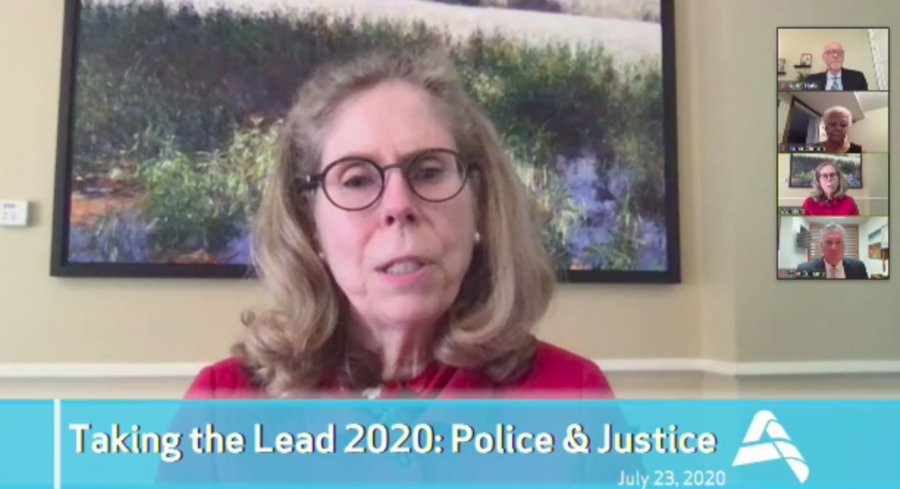- News
- News / Politics And Administration
- News / Politics And Administration / Campus
- News / Politics And Administration / City
Final part of ‘Taking the Lead 2020’ centered around policing and policy within a community
The final “Taking the Lead 2020” discussion took place Thursday night with panelists Ames Mayor John Haila and Iowa State University President Wendy Wintersteen.
July 23, 2020
The final “Taking the Lead 2020” discussion took place Thursday night with panelists Ames Mayor John Haila and Iowa State University President Wendy Wintersteen.
The topic of discussion for the night was on how policing and policy decisions are developed and enforced within a community culture. The forum was monitored by the CEO of Ames Chamber of Commerce, Dan Culhane.
One question regarded issues relating to policing and injustice and what is being done to handle those issues.
Wintersteen said she thanks the Police Chief Michael Newton for all the work he has done to establish a “community-centered approach to public safety” and referenced how Newton had been called upon by Harvard University to learn more about the work of his team on Iowa State’s campus. She said she hopes to make this more known locally.
Wintersteen went on to talk about the work the engagement and inclusion officers are doing in different community programs. She said the programs revolve around building a culture of respect and free of discrimination. The program includes full-time mental health advocates and all of the officers are trained in mental health response.
“Programs like tailgate with the cops or T-shirt giveaways that our police officers do, they help to reduce the stigma that is sometimes associated with law enforcement and that makes a difference right, to see the ISU police in a different light, to know them as individuals truly make a difference,” Wintersteen said.
Haila said an issue the Ames Police force needs to focus on — also a city issue — is to build trust, relationships and communication with the community and secondly to make stronger community policing.
“Our Ames Police Department is committed to that, they do desire to help those in need by using local resources as well as local agencies,” Haila said. “So with the City Council’s knowledge and our full support, the Ames Police Department will continue to develop those relationships, build trust and foster communication with community members.”
One way the Ames Police Department does this is through “safe neighborhood teams,” which consists of four officers that interact with community members through email, attending block parties and other forms of communication to have a better understanding of what is going on in neighborhoods and to help build trust, Haila said.
Another question regarded the policies that are promoted and enforced to ensure students or residents that have contact with any kind of local law enforcement have equitable outcomes.
Haila referenced the previous discussions and the training officers have to go through to address implicit bias and bias as well as treating residents in an equitable manner.
Haila said police want to hear if people have issues and there is a process people can go through to present their complaints by reporting to a shift supervisor, or if there isn’t adequate help, they can turn to the police chief. He said he is aware there may be discomfort in this process and they are starting to explore how to use technology to report these complaints or concerns regarding law enforcement.
Ames also has a human relations commission for bias or discrimination complaints. Civil rights violations are referred to as trained individuals at the state level Civil Rights Commission.
Haila said there are multiple feedback systems the Police Department uses to assess their own opposition, such as feedback from the city attorney and city manager.
“We look to that to also get feedback in terms to see how we are doing. We are endeavoring to ensure we can understand what is going on and make improvements where it is necessary. And I said this once and I will say it again, we are not perfect, we have room for improvement, there are things that need to be dealt with,” Haila said. “But the only way to do that is to understand what is going on and I am pleased to say, because of these sessions, that conversation is beginning and we are getting more feedback and I will say the Police Department is taking it very seriously, the city manager is taking it very seriously and we are taking it very seriously as Council and we are endeavoring to address those, become more aware of them and how to move forward.”
Wintersteen said the Police Department actively engages with the vice president for diversity and inclusion office to offer presentations and seminars to be engaged, such as campus conversations like “Big or Small Do You Call?”
It was a review of racial bias during police interactions and responding to calls that are not relevant or accurate to the action that is being described to the Police Department.
“To be able to have a conversation with students, having the police in the room to be able to have a conversation about this, that is a way that we can let students share terribly unfortunate experiences they may have had, but also for other students to learn what the situation is,” Wintersteen said.
Iowa State Police Department also has a student advisory board for students to have an opportunity to provide advice to the Police Department, ask questions and review policies. Wintersteen said it is things like this that help students have a voice in how policies are being implemented.
The final Taking the Lead 2020 discussion can be found on the city of Ames YouTube Channel 12 and on the Ames NAACP Facebook page and website in the next upcoming days.







